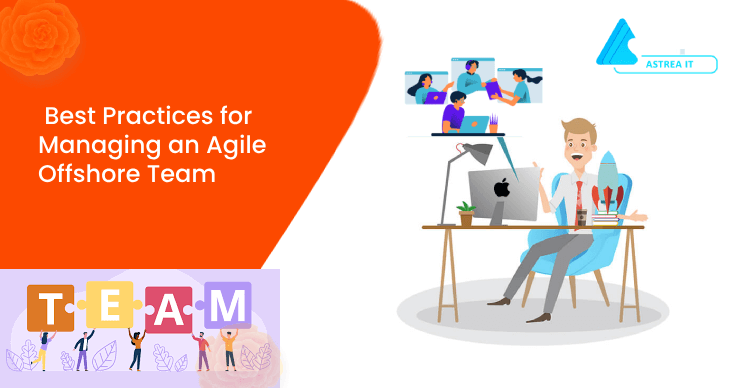Introduction:
Agile methodologies have revolutionized the software development landscape, emphasizing adaptability, collaboration, and continuous improvement. As businesses increasingly embrace the advantages of offshore teams, effectively managing agile practices in a distributed environment becomes paramount. In this blog, we'll explore best practices for managing an agile offshore team to maximize productivity, collaboration, and project success.

1. Clear Communication Channels:
Agile methodologies thrive on open and transparent communication. Establish clear and efficient communication channels to bridge the geographical gap. Utilize collaboration tools, such as Slack or Microsoft Teams, to ensure real-time communication and maintain a constant flow of information among team members.
2. Define Clear Roles and Responsibilities:
Clearly define the roles and responsibilities of each team member. This is especially crucial in an offshore setting where face-to-face interactions may be limited. Clearly articulated roles help avoid confusion, streamline decision-making, and ensure everyone understands their contribution to the project.
3. Implement Agile Project Management Tools:
Leverage agile project management tools like Jira, Trello to facilitate effective collaboration and project tracking. These tools allow teams to manage backlogs, plan sprints, and monitor progress in real-time, fostering transparency and adaptability within the agile framework.
4. Establish a Shared Understanding of Agile Practices:
Ensure that the entire team, both onshore and offshore, has a shared understanding of agile practices, principles, and terminology. Conduct training sessions if necessary and encourage ongoing learning to keep the team aligned with agile methodologies.
5. Time Zone Considerations:
Time zone differences can either be a challenge or an asset, depending on how they are managed. Schedule regular meetings that accommodate the diverse time zones of your offshore team, and consider adopting asynchronous communication methods to allow team members to work at their most productive hours.
6. Foster a Collaborative Culture:
Building a collaborative culture is essential for agile success. Encourage team members to share ideas, provide feedback, and contribute to discussions. Use video conferencing tools for face-to-face interactions, helping to build stronger connections and fostering a sense of camaraderie among team members.
7. Regular Sprint Reviews and Retrospectives:
Conduct regular sprint reviews to showcase completed work and gather feedback from stakeholders. Additionally, schedule retrospectives at the end of each sprint to reflect on the team's performance, identify areas for improvement, and implement changes to enhance efficiency and collaboration.
8. Continuous Integration and Testing:
Implement continuous integration and testing practices to ensure that code changes are regularly integrated, tested, and validated. Automation tools like Jenkins or Travis CI can streamline this process, enabling the team to deliver high-quality software consistently.
9. Build Trust Through Metrics and KPIs:
Use metrics and Key Performance Indicators (KPIs) to measure the team's performance objectively. Metrics such as velocity, sprint burndown charts, and defect rates provide valuable insights into the team's progress and help build trust between onshore and offshore team members.
10. Regular Team Building Activities:
Foster team cohesion by organizing regular virtual team building activities. These activities help strengthen bonds among team members, improve collaboration, and create a positive work environment, even when physically distant.
Conclusion
Effectively managing an agile offshore team requires a combination of clear communication, shared understanding, and a commitment to agile principles. By embracing collaboration tools, fostering a culture of transparency, and adapting agile practices to the unique challenges of offshore work, businesses can navigate the complexities of global software development and achieve project success. Remember, agility is not just about processes; it's a mindset that, when applied thoughtfully, can transform offshore teams into powerful contributors to your organization's success.
For any queries please reach out to support@astreait.com